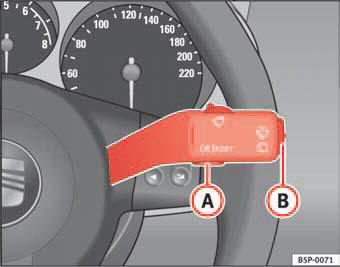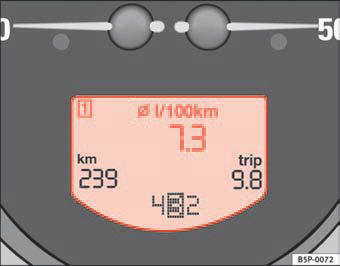Seat Leon >> Displays in the multi-function display (MFD)*

Fig. 40 Windscreen wiper and washer lever: Button A and rocker switch B

Fig. 41 Digital screen on the instrument panel: Average fuel consumption display
You can switch between the following displays in the multi-function display (MFD) by operating the rocker switch fig. 40 B on the windscreen wiper lever.
Memory displays
• Journey duration
• Speed warning
• Average speed
• Distance
• Distance to empty (the distance you can travel with the remaining fuel)
• Average fuel consumption
• Current fuel consumptio
min - Journey duration
The display shows the amount of time that has elapsed since the ignition was
switched on.
The maximum display value in both memories is 99 hours and 59 minutes.
The memory will automatically be deleted once this value has been reached
Set speed indicator
When driving at the required speed, enter the speed indicator mode and
press the button A (Reset), the display remembers the indicated speed. If
the indicated speed is exceeded, a warning text is displayed on the screen6)
and a warning signal sounds.
This may be deactivated by pressing the button A (Reset).
The speed may be altered using the rocker switch B in steps of 5 km/h within 5 seconds of the initial memory value.
Ø mph - Average speed
The average speed will be shown after a distance of approximately 100
metres has been travelled. Dashes will appear in the display until that time.
The display will be updated every 5 seconds whilst the vehicle is in motion.
Miles - Distance travelled
The display shows the distance travelled since the ignition was switched on.
The maximum display value in both memories is 9999 miles. The memory will automatically be deleted once this value has been reached.
 Miles - Fuel range
Miles - Fuel range
The fuel range is calculated using the figures for tank content and current fuel
consumption. It shows how far the vehicle can travel using the same conditions
as a reference.
Ø litre/100km - Average fuel consumption
The average fuel consumption will be shown fig. 41 after a
distance of approximately 100 metres has been travelled. Dashes will appear
in the display until that time. The display will be updated every 5 seconds
whilst the vehicle is in motion. The amount of fuel used will not be shown.
litres/100km or litres/hr - Current fuel consumption
The display will show the current fuel consumption in litre/km whilst the
vehicle is in motion or in litre/hour when the vehicle is in a stationary
position
with the engine running.
Using this display you can see how your driving style affects fuel consumption
Ambient temperature display
The measurement margin extends from -45°C to +58°C. At temperatures
lower than +4°C, an “ice crystal symbol” is displayed and a “warning” sounds
if the vehicle is moving at more than 20 km/h (ice warning). This symbol will
flash for about 10 seconds and remains lit until the exterior temperature rises
above +4°C or 6°C if it was already lit.
WARNING
There could be black ice on the road surface even if the “snowflake symbol”
is not shown. You should, for this reason, not rely exclusively on this
display - Risk of accident!
Note
When the vehicle is stationary or travelling at very low speeds, the temperature
displayed may be slightly higher than the actual ambient temperature as
a result of the heat radiated from the engine.
 Display with multi-function display (MFD)*
Display with multi-function display (MFD)*
The multi-function display (MFD) shows you diverse journey
and consumption data.
Fig. 38 Windscreen wiper
and washer lever: Button
A and rocker switch B
Fig. 39 Digital screen on
the instrum ...
 Warning or information text in the display
Warning or information text in the display
Faults are shown in the display with warning lamps and
warning/information reports.
The system runs a check on certain components and functions when the ignition
is switched on and while the vehicl ...
See also:
Adjusting glass panel
Checking height adjustment
Note
Front glass panel must only be adjusted at front edge -1- and rear
glass panel at rear edge -2-.
To achieve the best possible optical appearance, ensure that ...
